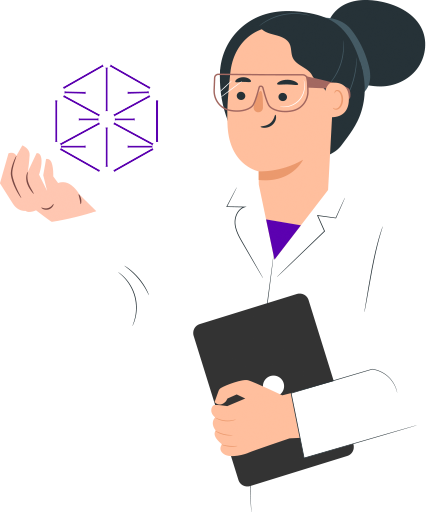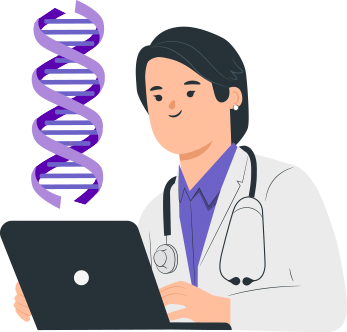Patient Journey

DIPCAN foresees the inclusion of a total of 2000 patients from all over Spain with non-hematological metastatic solid tumors. This is an observational study, so no treatment will be provided to improve the survival or quality of life of the patients. In this study medication will not be administered. Only diagnostic tests will be performed (blood tests, an image test of Nuclear Magnetic Resonance (NMR) of the whole body). As a patient, you will also be asked to submit a recent tumor sample for pathological analysis and genomic and tumor expression analysis.
All participants in the study will undergo the same diagnostic tests. Thus, if you will be part of DIPCAN, this will be your journey:
1.
First, as a patient, you must review all the requirements to be part of the DIPCAN study. This includes being over 18 years of age and having been diagnosed with a non-hematological metastatic cancer.


2.
Then, your second step must be filling the registration form: it is quite simple, as you just need to answer a few questions and give your personal and contact details through our register website. Then, you will be registered there and given a user, with a unique username and password.
Once your registration on the website has been confirmed, you will be informed about the participation conditions and the use of your data. Then, you will be asked to verify and accept the terms and conditions of use. In order to do so, you will need to sign the pre-screening informed consent (online) on the digital platform and provide some minimum identification data, personal and health characteristics (date of birth, type of tumor, presence of metastasis…) that will allow us to make a first assessment of whether you would be a suitable candidate for the study. You will also be asked for your contact details, so that you can be contacted for your first visit to any of the centers participating in the study, in case you are considered a good fit for the study.
3.
Once you have filled the form, the medical team of the study will evaluate the data you have entered in the digital platform to determine whether you meet the inclusion and exclusion criteria defined in the DIPCAN study. Afterwards, you will receive an email where they will inform you if you have been considered as a FIT or NO FIT patient to go ahead with the study.

If you are considered an FIT patient, you will be contacted to set up a date for the first consultation with the oncologist. In this first visit, they will tell you about the study and the
Tests that will be performed. If you agree with all what has been explained, the specialist will then ask you a series of questions with the intention of obtaining a clinical history as precise and exhaustive as possible to evaluate if as a patient you finally APT or NOT APT are to fully participate in the study.
Then, you will receive a link via email to download a mobile App where you will have access with your username and password. Through your identification code, you will have access in this app to all your data and you will be able to download the reports of the different tests of the study.

4.
At this point, you will receive a request to submit a tumor sample from the most recent biopsy you have, if possible.
However, not having a recent tumor sample won’t limit your participation in the study. Once you have the requested sample, it will be shipped to the MD Anderson Cancer Center Madrid Foundation, who will send it to Eurofins Megalab, where it will be evaluated and then analyzed. However, if more convenient for you, Eurofins Megalab could request the tumor block directly on your behalf from the medical center where the sample is located after signing the corresponding authorization and consent.
From there, Eurofins Megalab, together with Pangaea Oncology, will carry out a complete histopathological and molecular study of the tumor sample to determine characteristics that in the future may make you, as a patient, eligible to receive targeted treatments. Moreover, the genomic studies will make it possible to analyze the mutations related to your disease, some of which could allow you to access targeted therapies with a more personalized approach, as well as giving you the possibility of facilitating your participation in various clinical trials. Also, other mutations for which no targeted drugs are known to date could be detected. This could be of great relevance in predicting the behavior of your disease and your response to certain treatments.
If you do not have a recent tumor sample, you’ll be offered to do a liquid biopsy, which would consist of conducting a study of mutations in your blood instead of in the tumor tissue. However, there is a probability that the results obtained from this study do not detect any relevant alterations or do not allow any specific action to be taken in your particular case.
5.
Nevertheless, we will make an appointment with you to visit MD Anderson Cancer Center Madrid Hospital where you will undergo a radiomic analysis and a full body MRI scan without contrast, so the tumor is automatically and quantitatively described. It is a non-invasive test that takes place in a closed machine and lasts between 20 and 60 minutes.
It is important for you to know that in the hypothetical case that the MRI scan identifies findings (spinal cord compression, symptomatic brain metastases…) for which you require urgent medical attention, the doctor performing the study will inform you of these results and of the need for immediate medical attention at your referral center or the one you consider appropriate. However, you should be aware that the DIPCAN study does not cover the cost of such medical, if necessary.


6.
During the beforementioned visit to the MD Anderson Cancer Center Madrid, you will also have a blood sample taken, which will also be sent to Eurofins Megalab, where it will be processed for the study of various parameters usually found in a complete blood count (hemogram, biochemistry, liver function tests, kidney function tests, tumor markers…). Genetic material that can be used in molecular studies of the tumor will be also extracted from this sample.
Now, the specialized personnel of the 7 collaborating entities will begin working on the integration of the data obtained in the platform. All parameters will be anonymized and coded for the subsequent generation of the artificial intelligence algorithm.
7.
Llegado este punto será el personal especializado de las 7 entidades colaboradoras quienes empiecen a trabajar en la integración de los datos obtenidos en la plataforma. Todos los parámetros se anonimizarán y se codificarán para la posterior generación del algoritmo de inteligencia artificial.


8.
Finally, after approximately one month from your first visit, the center will arrange with you a last visit at the starting center where you will receive all the results obtained, so they can be explained in detail and all your questions will be answered.
Also, you will be given the analysis report, as well as different reports that include the associated magnetic resonance images, the digitalized images of the tumor, the molecular characterization of the tumor and the clinical interpretation of the alterations found. Lastly, you will also receive a clinical report with the explanation in an understandable language.
It is worth mentioning that all the results of all these tests will be confidential. You will be able to consult them with your passwords and share them with other doctors or centers if you consider it necessary under your own responsibility.
What if my application is NOT APT for the study?
It is fundamental for you to know that if during the first visit, you do not meet the selection criteria and you are NOT APT to participate in the study, the oncologist will indicate so in the platform and thus, the system will automatically delete all your data.
Use of Samples
Blood samples and all the clinical data associated with them will be kept under the adequate security conditions. They will remain under the custody of a private collection of the DIPCAN study for 5 years in accordance with current regulations. The custody and pseudo-anonymization of the data will be carried out in accordance with the provisions of Law 14/2007 of July 3, 2007, on biomedical research, and the Royal Decree 1716/2011 of November 18, 2011, which establishes the basic requirements for the authorization and operation of biobanks for biomedical research purposes, ensuring the subjects cannot be identified through means considered reasonable by persons other than those authorized.
Thus, the data generated by each patient:
· Could help the patient’s own personalized medicine, promoting that each patient would have a better knowledge of his/her oncological disease and contributing to the fact that in the future his/her treatment could be adapted to the alterations found.
· Could help creating an artificial intelligence algorithm, so it would help the medicine of the future and having a better understanding of cancer from a joint point of view and providing new knowledge that could contribute to the development of health strategies.



